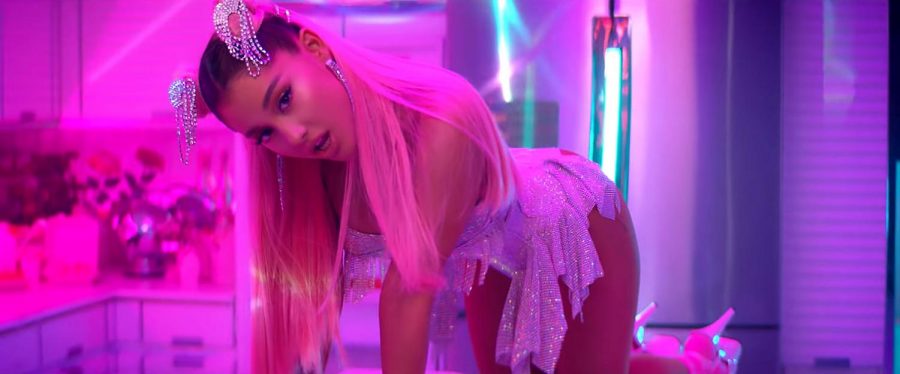Pop music artists appropriate aspects of black culture
Ariana Grande has recently come under fire for adopting popular elements of black culture in both her music and public image, which many have labeled as cultural appropriation.
Cultural appropriation is defined as “the unacknowledged or inappropriate adoption of the customs, practices, ideas, etc. of one people or society by members of another and typically more dominant people or society” (Dictionary.com). Particularly important in cultural appropriation definition is the term “unacknowledged”. Many white celebrities have had accusations of cultural appropriation levied against them not necessarily because they adopted the customs or styles elements of different cultures, but because they failed to acknowledge the culture when adopting those elements.
In 2016, Kim Kardashian styled her hair in cornrows, for which she received a great deal of attention and praise. However, Kardashian insisted on calling her hairstyle “boxer braids” and never acknowledged the black community’s unique connection to her hairstyle (Teen Vogue). By changing the popular name of her hairstyle—the name embraced by black culture—Kardashian shunned the origins of her hairstyle, instead unilaterally claiming credit for popularizing it.
While cultural appropriation has been well-documented in a variety of spheres, pop music remained relatively isolated from any major scandals until the last couple of years, when hip-hop collided with mainstream music. As more black artists have gained popularity, some features of black culture, once the source of discrimination and stereotypes, have become major trends for white and black artists alike to flaunt.
“Black culture has definitely become pop culture recently,” junior Yosan Tewelde said. “In one sense, it shows the influence these black artists are having if other artists are trying to be like them, but on the other hand, [white artists] are getting the acclaim that no other artist of color has gotten before.”
Ariana Grande has been accused of perpetuating the trend of white artists artificially adopting and popularizing black culture. She has been noted to consistently speak in a “blaccent”, an oversimplified version of African-American dialect, and makes regular use of the word “issa”, a word created and used by the black community. In terms of appearance, some have criticized Grande’s intense tanning, which changes her skin tone to dark olive, as an attempt to appear “racially ambiguous” and earn diversity points.
On a professional level, Grande’s song “7 rings”, a blend of pop and hip hop influences that features a rap-based chorus, has received accusations of plagiarism from two black artists, Soulja Boy and Princess Nokia, who accused Grande of stealing their beats. 2 Chainz also accused Grande of imitating a pink trap house he set up in Atlanta in her music video for “7 rings” (The Atlantic).
While the accusations of plagiarism have yet to be substantiated, Grande certainly has adopted elements of hip hop, most of them originating from black artists, into her music style and filtered parts of black culture into her public persona.
What makes Grande’s case complicated is that she has made attempts to acknowledge the artists that influence her music, most of whom are African-American R&B singers (Buzzfeed
News). Though she certainly hasn’t offered extensive credit in “7 rings” to any sources the beats and styles are derived from, Grande has at least made some effort to afford recognition to the oftentimes marginalized voices and talent of black artists.
“Acknowledging who came up with the idea or whose culture is from is half of it,” Tewelde said. “I think that’s the difference between appreciating and appropriating.”
On the other hand, Grande has never acknowledged the origins of her dramatic shift in dialect. Comparing her speech in interviews prior to her pop music fame and her recent interviews, Grande appears to have become heavily reliant on black vernacular only recently.
While many instances of cultural appropriation are like Grande’s, unintentional and blurring the lines of what defines cultural appropriation, it seems clear that Grande could at least offer more explicit credit to black artists in her music and acknowledge the origins of–or even scuttle altogether–her vernacular. A more concerted effort by white artists to acknowledge original creators and cultural influences may not rectify systemic barriers for artists of color, but they could help them receive the same acclaim and profit as the white artists who popularize their creativity.

Shawna Muckle, 17, is a senior at Jesuit High School. She has been a member of the Chronicle staff for three years in various capacities, and she is currently one of its chief editors. Shawna is fascinated by politics and government, and she enjoys writing articles for the Chronicle pertaining to local and national political developments, alongside issues tied to social justice and personal identity. Some of her favorite pieces she’s written include a feature on Jesuit students’ experience with microaggressions, a recap of the 2018 midterm elections, and an article discussing last year’s clerical abuse scandal within the Catholic Church. Outside of journalism, Shawna is the leader of Jesuit’s Model United Nations club and a member of her school’s Ethics Bowl team, which was a 2019 national champion. Shawna is also a Precinct Committee Person for the Washington County Democrats. In her free time, Shawna can be found aggressively running up hills, drinking boba, and yeeting off on road trips to Seattle (for unspecified reasons). Ask her about her opinions on Congress, specifically a) Republicans and b) the crisis with the federal deficit. In the future, Shawna hopes to pursue journalism in college and, later on, as a congressional reporter in DC.



